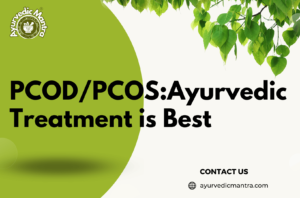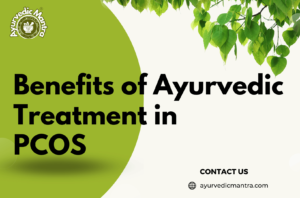
PCOD/PCOS: Ayurvedic Treatment is Best
Introduction Polycystic Ovary Disorder (PCOD) or Polycystic Ovary Syndrome (PCOS) is a common endocrine disorder affecting millions of women worldwide. It leads to hormonal imbalances,


In recent years, Ayurveda, an ancient system of natural healing originating from India, has gained significant popularity as an alternative approach to treating various health conditions. One such condition that has drawn attention is hypothyroidism, a common disorder when the thyroid gland fails to produce enough thyroid hormones. This article explores the potential of Ayurveda in managing hypothyroidism and whether it can be a viable alternative to conventional treatments.
Before delving into the Ayurvedic perspective, it is crucial to comprehend the basics of hypothyroidism. The thyroid gland in the neck plays a pivotal role in regulating metabolism by producing hormones that control various bodily functions. When the thyroid gland does not generate enough hormones, the body’s metabolism slows down, leading to symptoms like fatigue, weight gain, cold sensitivity, and dry skin.
The conventional approach to managing hypothyroidism involves the use of synthetic thyroid hormones. Patients are usually prescribed medications such as levothyroxine, which help supplement the deficient hormones. While this treatment is generally effective, some individuals may experience side effects or find achieving the optimal hormone balance challenging.
Ayurveda views health as a harmonious balance between mind, body, and spirit. According to Ayurvedic principles, hypothyroidism can occur due to imbalances in the body’s doshas (vata, pitta, and kapha). The condition is often associated with an aggravated form of kapha dosha, linked to water and earth elements.
Ayurvedic practitioners focus on identifying the root cause of the imbalance rather than just addressing the symptoms. They believe that by restoring balance and improving overall well-being, the body can heal itself. However, it is essential to note that Ayurveda is a holistic system, and its effectiveness can vary from person to person.
While Ayurvedic approaches show promise in managing hypothyroidism, it is essential to approach them with caution and under the guidance of a qualified Ayurvedic practitioner. Self-medication or unguided use of herbs can have adverse effects and may not be suitable for everyone.
Moreover, Ayurveda is not a replacement for conventional medical treatment. It can complement conventional approaches; individuals are advised to consult their healthcare providers before changing their treatment plans.
In conclusion, Ayurveda offers a holistic approach to managing hypothyroidism, focusing on restoring balance and overall well-being. While it may not be a cure-all, Ayurvedic practices have shown potential in supporting thyroid health and improving the quality of life for individuals with hypothyroidism. When considering Ayurveda as a treatment option, seeking guidance from a qualified practitioner is crucial to ensure safe and effective management of the condition. As with any health concern, individual responses to treatments may vary, and it is always best to consult with healthcare professionals for personalized advice.
Related Blog: Thyroid in Women: Causes, Symptoms & Ayurvedic Medicine
Frequently Asked Questions (FAQs) about Hypothyroidism and Ayurveda
Hypothyroidism is a medical condition characterized by an underactive thyroid gland, leading to inadequate production of thyroid hormones. These hormones regulate metabolism, energy levels, and various bodily functions. When the thyroid gland does not produce enough hormones, it can result in symptoms like fatigue, weight gain, constipation, dry skin, and sensitivity to colds.
Conventional treatment for hypothyroidism typically involves synthetic thyroid hormone replacement therapy, with levothyroxine being the most commonly prescribed medication. While this treatment is generally effective in restoring hormone levels, some individuals may experience side effects such as heart palpitations, nervousness, or allergic reactions to the medication. Achieving the optimal dosage can also be challenging for some patients.
While Ayurveda offers a holistic approach to managing hypothyroidism, it is essential to clarify that it does not claim to cure the condition completely. Instead, Ayurvedic treatments aim to restore balance in the body, support thyroid health, and alleviate symptoms associated with hypothyroidism. The effectiveness of Ayurvedic practices can vary from person to person, and complete resolution of the condition is not guaranteed.
Ayurveda views health as a balance between the body’s doshas (vata, pitta, and kapha). Hypothyroidism is often associated with an aggravated kapha dosha linked to water and earth elements. Ayurvedic treatments focus on identifying and addressing the root cause of the imbalance rather than just alleviating symptoms. This could involve dietary modifications, herbal remedies, yoga, meditation, and lifestyle changes.
Ayurveda recommends a diet that balances the aggravated kapha dosha. This may involve consuming warm and light foods, such as cooked vegetables, whole grains, and lean proteins. At the same time, individuals are advised to reduce their intake of cold and heavy foods, as they can further aggravate the condition.
Yes, Ayurvedic practitioners often use specific herbs known for their rejuvenating and balancing properties to support thyroid health. Ashwagandha, Guggulu, and Triphala are some of the herbs commonly recommended to aid in regulating the thyroid gland and promoting overall well-being.
Stress can exacerbate imbalances in the body, including those related to hypothyroidism. Engaging in yoga, pranayama (breathwork), and meditation can help reduce stress levels, promote relaxation, and enhance overall well-being. By managing stress effectively, individuals may experience positive effects on thyroid function.
No, Ayurveda is not a replacement for conventional medical treatment. Instead, it can complement standard approaches and be a supportive therapy. Individuals with hypothyroidism are encouraged to consult their healthcare providers before making any changes to their treatment plan and to integrate Ayurvedic practices safely under the guidance of a qualified Ayurvedic practitioner.
Ayurvedic treatments are generally considered safe when used appropriately and under the guidance of a qualified practitioner. However, as with any form of treatment, there may be potential side effects or risks, especially if self-medication or improper use of herbs is practised. It is essential to seek professional advice and inform the Ayurvedic practitioner about any existing medical conditions or ongoing treatments.
Ayurvedic approaches may benefit individuals with subclinical hypothyroidism. In this milder condition, thyroid hormone levels are slightly lower than usual but may not meet the clinical hypothyroidism diagnostic criteria. In such cases, Ayurveda can support thyroid health and overall well-being, potentially preventing the progression to clinical hypothyroidism.

Introduction Polycystic Ovary Disorder (PCOD) or Polycystic Ovary Syndrome (PCOS) is a common endocrine disorder affecting millions of women worldwide. It leads to hormonal imbalances,

Introduction Losing weight is a journey that requires dedication, consistency, and self-care. While there are numerous weight loss techniques out there, not all of them

Polycystic Ovary Syndrome (PCOS) is a hormonal disorder that affects millions of women worldwide. It can lead to various health complications, such as irregular periods,

In recent years, Ayurveda, an ancient system of natural healing originating from India, has gained significant popularity as an alternative approach to treating various health

आजकल वजन बढ़ने और चर्बी की वृद्धि होने की समस्या एक आम समस्या बन गई है। बढ़ते वजन और अतिरिक्त चर्बी के कारण न केवल

प्रस्तावना: आजकल वजन बढ़ने और ओबेसिटी की समस्या एक आम समस्या बन गई है। बढ़ते वजन के कारण न केवल शारीरिक समस्याएं होती हैं, बल्कि
